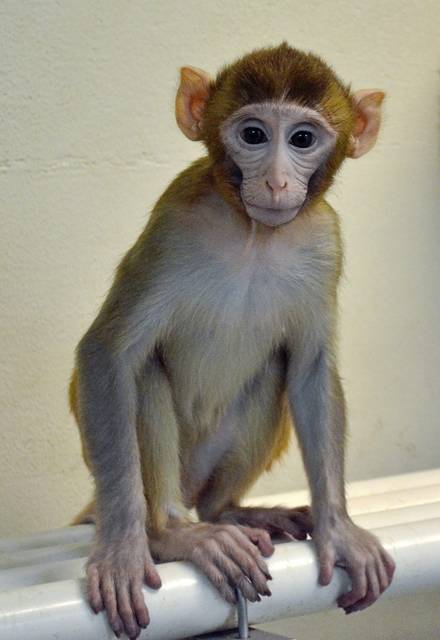The birth of a healthy baby monkey in an Oregon lab signals hope for childhood cancer survivors who want biological children, University of Pittsburgh researchers said in a paper set for publication Friday.
The monkey’s name is Grady, and she weighed 1 pound, 0.6 ounces when born last April at the Oregon National Primate Research Center in Beaverton. She’s exhibiting healthy social behaviors and playtime activities as she approaches her first birthday.
Grady is the result of an experimental cryotherapy process that provides evidence that infertile mammals can regain the ability to produce sperm through the freezing of testicular tissues that can be removed, stored and implanted later, researchers concluded in the paper published in the research journal “Science.” The paper is based on a collaborative study involving the University of Pittsburgh’s School of Medicine, Magee-Womens Research Institute and Oregon Health and Science University.
The study marks the first time that frozen and thawed testicular tissues have been used, not only to produce viable sperm, but also a healthy offspring, said Kyle Orwig, the study’s lead author and a professor of reproductive sciences at Pitt’s School of Medicine.
If Grady’s success story can be replicated, Orwig is hopeful that the techniques can be used on people within the next two to five years.
That means there’s potential to help restore the fertility to some of more than 200 young patients from across the United States and abroad who have had their reproductive tissues frozen at UPMC’s Fertility Preservation Program in Pittsburgh.
“This advance is an important step toward offering young cancer patients around the world a chance at having a family in the future,” Orwig said. “It’s the last step before you go to the human clinic.”
The need for such an advancement is mounting as childhood cancer survival rates climb. More than 80 percent of children with cancer now survive five years or more, compared to less than 10 percent who survived 50 years ago, federal data show.
Chemotherapy, radiation cause infertility
Because of the toxicity and damage caused by cancer treatments, nearly one-third of childhood cancer survivors will be infertile as adults, Orwig said.
Chemotherapy and radiation can deplete sperm stem cells and result in permanent infertility.
Adult men can freeze their sperm and store to later have a biological child, but “sperm freezing is not an option for prepubertal boys, who are not yet producing sperm,” researchers said in the paper.
“We should be educating all patients about the effects of their therapies and that we have options to preserve their fertility,” Orwig said. “If we don’t have the discussions before they start the chemotherapy or radiation, there’s nothing we can do about it.”
The cryopreservation method aims to preserve the fertility of patients who have not experienced puberty before they undergo therapies to treat cancer and other conditions, such as sickle cell anemia.
How the experiment worked
Orwig and his team grafted small pieces of immature testicular tissue from five rhesus macaque male monkeys that had not yet reached puberty. Researchers cryptopreserved the tissue for up to five months, then thawed and transplanted the tissue under the skin of the same animals.
Over the next eight to 12 months, after the animals entered puberty, researchers removed the grafts and found large amounts of sperm cells to be present. They sent the sperm to their Oregon research partners, who were able to generate viable embryos.
Six female monkeys received 11 embryos, and one took.
On April 16, 2018, Grady was born. Her name is based on the combination of “graft-derived” and “baby.”
Researchers said the process might not work for patients with malignant cancers that already have spread too far. That means it might not be appropriate for children with advanced leukemia, lymphoma or testicular cancers.
It could be beneficial, however, for patients who undergo high-dose chemotherapy before receiving bone marrow transplants, such as children with sickle cell anemia. It also could be used by patients who have solid tumors such as sarcomas and neuroblastomas that have not metastasized to the scrotum.
More than 60 percent of 206 patients who froze their reproductive tissues at the program in Pittsburgh had conditions that fall into the categories that could take advantage of the procedure, Orwig said.
Orwig said that researchers in northern Europe have been producing some of the most promising research in the field, including scientists from Belgium and the Netherlands. He does not know of another fertility preservation program in the state other than at the University of Pennsylvania.
The Pitt study was funded by the National Institute on Health and UPMC Magee-Womens Research Institute and Foundation. Additional collaborators included researchers from OHSU, the University of Texas and the University of Calgary.
For more information about UPMC’s Fertility Preservation Program in Pittsburgh, go to FertilityPreservationPittsburgh.org/.











